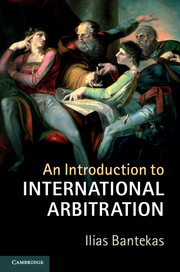Book contents
- Frontmatter
- Epigraph
- Contents
- Preface
- Table of cases
- Table of treaties
- Table of domestic laws
- Institutional Rules and Soft Law
- List of abbreviations
- 1 An introduction to international arbitration
- 2 The laws and rules applicable to arbitration
- 3 The agreement to arbitrate
- 4 The arbitral tribunal
- 5 Arbitration and the courts
- 6 The conduct of arbitral proceedings
- 7 Arbitral awards and challenges against awards
- 8 Recognition and enforcement of arbitral awards
- 9 Consumer and online arbitration
- 10 Investment arbitration
- Index
1 - An introduction to international arbitration
Published online by Cambridge University Press: 05 August 2015
- Frontmatter
- Epigraph
- Contents
- Preface
- Table of cases
- Table of treaties
- Table of domestic laws
- Institutional Rules and Soft Law
- List of abbreviations
- 1 An introduction to international arbitration
- 2 The laws and rules applicable to arbitration
- 3 The agreement to arbitrate
- 4 The arbitral tribunal
- 5 Arbitration and the courts
- 6 The conduct of arbitral proceedings
- 7 Arbitral awards and challenges against awards
- 8 Recognition and enforcement of arbitral awards
- 9 Consumer and online arbitration
- 10 Investment arbitration
- Index
Summary
Introduction
This chapter is aimed at introducing the reader to the fundamentals of international arbitration. It will firstly cement the legal basis of the parties’ autonomy to submit disputes to arbitration and subsequently trace the three phases within which international arbitration is conducted, from the drafting of the agreement all the way to the recognition and enforcement of the award in a jurisdiction other than that in which it was rendered, where pertinent. Having comprehended how arbitration works we then go on to assess other alternative dispute resolution mechanisms and their benefits (as well as disadvantages) as compared to litigation. The chapter will then examine three fundamental distinctions, namely international versus domestic arbitration, commercial versus non-commercial arbitration and institutional versus ad hoc arbitration. It concludes with two fundamental concepts, namely separability and arbitrability, whose impact the reader will encounter throughout the book. Although many other principles are fundamental to arbitration they are best reserved for other chapters.
The theoretical foundations of arbitration
Four theories are generally employed to explain the legal foundations of arbitration, namely, the jurisdictional, contractual, mixed (hybrid) and the autonomous theories. Their common underpinning is the interplay between private control and state regulation of arbitration. Adherents of the jurisdictional theory suggest that the role of national law, particularly that of the seat of the arbitration, is of paramount importance. While the parties are free to choose arbitration over recourse to the courts and appoint their preferred arbitrators, it is the state which permits them to do so and as a result arbitrators are perceived as exercising a public function and possess a quasi-judicial status entitling them to the immunity enjoyed by ordinary judges.
The contractual theory is predicated on the principle of party autonomy, which is explained more fully in the following section. According to this, it is the will of the parties as expressed in their contract that dictates the choice of dispute settlement mechanism. In fact, the parties’ agreement to arbitrate overrides the jurisdiction or ordinary courts, the application of conflict of law rules, as well as the vast majority of procedural rules.
- Type
- Chapter
- Information
- An Introduction to International Arbitration , pp. 1 - 35Publisher: Cambridge University PressPrint publication year: 2015



